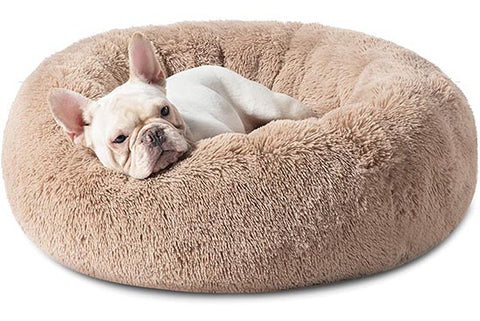Why Do Dogs Sleep So Close to You - Reasons & Preventions
If you're concerned that sharing your bed with your dog may disrupt your sleep, read our blog to learn everything you need to know about a dog sleeping in bed.
It is no longer acceptable for dog owners to confine their pets to the doghouse. Indeed, 55% of pet owners indicated they share their bed with at least one dog. Is it, nevertheless, a good idea to sleep with your dog?
While the matter has been debated for years, numerous studies have found that sleeping with your pet can benefit. The warmth of a dog's body, steady heartbeat, and protective attitude can make co-sleeping with them feel comfortable and cosy.
Why Does Your Dog Sleep So Close to You?
Dog sleeping in bed? Is it bad or good? There are so many things that come to mind when your dog naturally sleeps with you. But this behaviour might indicate something. let's see why your dog sleeps so close to you -

Sleeping against you is a natural instinct for dogs
Dogs are descended from wolves. Although many wolf-like qualities were bred out of domesticated dogs, others were not. Most notably, domesticated dogs are pack animals like their wolf ancestors.
Wolves are pack animals in the wild; thus, they will lie with their other pack members for warmth and security. This type of laying is truly crucial for wolf survival.
Your dog wants to protect you
Sleeping in piles serves to guard the pack; therefore, your dog may be doing it to protect you actively. As your dog's owner, it considers you a member of its pack. As a result, your dog will most likely want to lay near to you so that it can offer warmth and security for you, just as you do for it.
Even when there is no active threat, dogs frequently assume a protective or defensive posture. It is prepared to defend you in the event of an invader.
Sleeping with your dog enhances connection
Another reason your dog may be sleeping so close to you is to improve the attachment between you and your dog. As you are surely aware, dogs are a species that develops strong attachments to their owners. They desire to reinforce their relationships and undertake a variety of things to do so.
Separation anxiety might be the reason
Separation anxiety is a much more concerning reason for your dog sleeping so close to you. Although it is natural for dogs to miss their owners, separation anxiety is not, and it is something that must be treated for the dog's long-term health.
The dog will be notified as soon as you leave by sleeping so near you, whether that couch or the entire house. If you observe signs of concern every time you leave the house, separation anxiety could be the source of your dog's clingy behaviour.
Why do Dogs Sleep at The End of The Bed
If you're wondering why dogs sleep at the end of the bed rather than in the middle, here are several plausible explanations and what makes them more likely.
There's more space there
It might do this because there is more area to sleep there. This is more likely if your bed is small and your dog is a large breed.

Encouragement of the behaviour
It could be that it has been discovered that sleeping at the edge of the bed earns rewards. For example, if you touch its belly with your foot while it sleeps at the end of the bed but not when it sleeps higher up, it will likely do it more often in exchange for additional rewards.
Probably it had training
It's also possible that it was taught to sleep there. This is more likely if you taught it to sleep at the end of your bed when it was younger. In this instance, you may try training it to sleep higher up like how you first trained it.
It's defending itself
It's also possible that it's doing it to defend itself. This is because it will most likely be easier to move toward the end of your bed. This is particularly likely if it sleeps with its back to the door and becomes extremely protective at times.
It believes that if it sleeps higher, you would dislike it
There is evidence that dogs do not engage in a hierarchy, but your dog may believe that you will react negatively if it tries to sleep higher up.
Consider what happened when it initially began doing it
If your dog did not always sleep at the foot of your bed, think about what else happened when it first started doing so.
If it began doing so suddenly, it might be that it discovered that sleeping there earns it rewards or found it more comfortable than the prior sleeping spot.
Dog Sleeping in Bed - How Can It Help You?
Living with dogs has so many sparks. While some ask, "Why does my dog sleep so close to me?" It has its benefits. Let's look at some of the advantages of the dog sleeping with you.
Reduces Depression: A new study looked at how animal-assisted activities impacted depressed symptoms in humans. They observed that participants who undertook activities or treatment with dogs had lower depressive symptoms.
If simply engaging with a dog helps alleviate sadness, imagine what sleeping next to one may accomplish! Their presence relaxes us and boosts the flow of oxytocin, the love molecule. This essentially makes your dog a living antidepressant!

Increases Sense of Security: Feeling protected might have a big impact on how well you sleep. Your dog's instinct is to guard. They will notify you promptly if something goes wrong while you are sleeping. While this can be difficult for highly protective or sensitive dogs, many people find that knowing their dog protects them allows them to sleep better.

Eases Insomnia: There are few things worse than lying awake at night not being able to sleep. Good news for individuals with anxiety-related insomnia: having a dog in the bed can help!
Studies demonstrate that having a dog in the bed can help reduce insomnia by moderating anxiety and regulating hyperarousal and hypervigilance. All of this generates a better atmosphere and environment for slumber, which can help prevent insomnia.
Decreases Loneliness: Sleeping alone, especially for individuals who live alone, can exacerbate feelings of depression and pain. What better way to deal with loneliness than with a living bed warmer?
While some people prefer to sleep alone, new studies reveal that many people believe the presence of a pet helps them sleep. Co-sleeping with your dog is a great way to get company, security, and relaxation.

Reduces Stress: Have you heard of the term "The Pet Effect"? It's the phenomenon where you experience less tension and worry when your pet is there. 74% of pet owners say their mental health has improved due to having a pet.
As previously said, cuddling with your pet causes the production of oxytocin, a hormone that reduces stress and improves your mood. It can also help lower your heart rate and the stress chemical cortisol, allowing you to sleep better.
The Disadvantages of Dog Sleeping in Your Bed
Why does my dog sleep so close to me? Are there any cons to it? Before taking a final decision, it's wise to consider the pros and cons.
- Your lovely little puppy can take up disease, dirt, and fleas and bring them into your bed. There is also a risk factor, particularly if you have young children. When startled, even the sweetest-natured dog can snap in self-defence. A child who runs by furniture or beds where a dog is sleeping may unintentionally startle the animal. The unfortunate effect of an elevated dog's teeth coming into touch with a young child's face can be physically distressing for the child but may result in the death of a frightened dog.

- Some dog owners find it difficult to sleep with their dogs in the bed. Light sleepers are awakened when their dog rolls over, kicks, or scratches. Others are irritated when their dog snores excessively loudly. Sleep deprivation can make you cranky and weaken your immune system, affecting your general health.

- Some people are allergic to dogs in particular. Prolonged interaction with dogs exposes them to pet dander, which can cause respiratory issues. Even people who are not allergic to pets can have increased allergic symptoms when sleeping with their dogs. When dogs go outside, dust and pollen adhere to their fur, exacerbating human allergies. They may leave dander, pollen, and dust on the bed coverings, causing allergic reactions even after the dog has left the room.

- Dogs carry certain intestinal parasites, fleas, and ticks that cause human sickness. Sleeping with a dog exposes humans to parasites and vector-borne diseases. People who are extremely young, very old, or have weakened immune systems are especially vulnerable to infection.
Tips for Safely Sleeping with Your Dog
Our dogs are the best cuddlers in the world. Despite the drawbacks, you might want your dog sleeping with you. We're totally on board. Here are some suggestions to make this a better experience for both of you.
- Climbing on the bed can be difficult for your dog if he has musculoskeletal disorders, such as arthritis. You can pick up your arthritic dog and place him on the bed if he is little. If he is large, you may build a ramp or steps to help him climb into the bed. If your dog does not wiggle off the pee pads, they will keep the bedding dry.
- Wiping your dog down with a moist towel before bringing him inside is an excellent daily ritual that will reduce the amount of pollen and dust he brings inside. Bathing your dog, utilising HEPA filters in your home, and cleaning your bed linens regularly will limit your exposure to allergens, allowing your dog to reclaim his seat on the bed.
- Our veterinarian can recommend year-round, broad-spectrum parasite control to protect both your dog and you from parasites and vector-borne illnesses.

- If you train your dog to sleep at your feet, you can reduce the disruption if he moves during the night. Many dog owners feel safe and sleep better when snuggling next to their beloved buddies.
- Aggression is not tolerated. Sleeping with your dog will be challenging if they are aggressive against you or someone with whom you share a bed. That type of behaviour should not be tolerated in the sleeping area.
- Keep pets away from the covers. Some of the disadvantages of co-sleeping with your dogs, such as allergens and dirt invading the bed, can be mitigated. Train your dog to sleep atop the covers at your feet, and you will undoubtedly sleep better.
How to Get Your Dog to Sleep Elsewhere in The House
Why does my dog sleep so close to me? Sometimes it's frustrating since you can not get a sound sleep. If you don't want your dog sleeping in your bed, consider the options listed below.
Train to lay in a different location
Positive reinforcement training could teach your dog to sleep somewhere else at night. Positive reinforcement training encourages it to act in a certain way by rewarding it when it exhibits symptoms.
Try not to encourage the conduct
It may have been discovered that sleeping at the edge of your bed earns its benefits. If you don't want it to sleep there, it's a good idea to treat it when it doesn't sleep there and avoid praising it when it does.
Make a cosy sleeping spot for it
It would also be beneficial to make the sleeping place comfy. You should be able to encourage it to sleep there if you do so. The environment should be cool, not too bright, and quiet, with enough space to lay down comfortably. You can use a dog calming bed for this. You can find cosy & soft dog calming bed in Australia or search near your pet stores.
Make your bed inaccessible. You might have to think outside the box here. Put chairs, huge boxes, and furniture here. This can be aggravating, but it is fortunately just temporary until your dog learns to enjoy his new bed and all the benefits that come with it.
Create positive associations. During the day, keep your dog's new bed in the same room as you and offer him treats; furthermore, give him toys to play with there. The following is a step-by-step instruction to teach your dog to lie on a mat. Because of all the wonderful associations, the dog is eager to go and stay on the mat.
Drain energy as much as possible. Play, exercise, and mental stimulation should all be provided to make your dog more inclined to settle down at night. Exercise isn't a panacea, but it can occasionally help decrease your dog's threshold to change a potentially dangerous fit into a less dramatic performance.
A bedtime routine might help. Dogs enjoy routines. It gives them something to look forward to, and knowing what to expect is soothing.
Make a bedtime habit of carrying him to his bed and giving him something long-lasting to enjoy on it, such as a chew toy.
Dog Sleeping in Bed - Training to Stop It
It's time to face a hard reality. While we all love our pets and enjoy spending time with them, having a dog sleep in your bed is not always a pleasant experience. Sometimes you just need a little quiet time to recharge. That does not imply that you are a horrible parent. So, how can you educate the dog so that you can sleep soundly? Let's work together to make it happen.
Step 1: A foolproof approach for educating your dog not to sleep on the bed is to teach him the 'off' command. Begin by catching your dog while he is asleep on the bed. Even if he looks adorable nestled up in your comforter, you should refrain from rewarding or caressing him for this behaviour.
Step 2: Lure your dog off the bed (or couch or furniture) and onto the floor with a treat or yummy toy. Praise and reward with biscuits after he has all four paws on the floor.
Step 3: Once your pet is promptly fleeing the bed with the lure, begin incorporating the signal of a hand gesture or verbal command such as "off." Your dog will quickly associate the lure and treat reward with the cue.

Step 4: Give your pet the "off" command without a lure. You should lavishly praise and reward them the first few times they do the task.
Step 5: Reduce the rewards gradually so that your pet does not receive a cookie or treat every time he completes the assignment. This will encourage the behaviour and make your dog want to perform the command as quickly as possible to obtain a biscuit or food. To get your dog off the bed and keep him off for good, use the 'off' command liberally!
A tip for difficult cases: Finally, for rescue dogs or dogs who are struggling with the change, placing the dog bed on the human bed at night may be beneficial, and always thank the dog for choosing to stay in his bed. Following that, the dog bed can be progressively moved to the floor.
Final Words
It might be calming to have your dog sleep in your bed. It also has certain disadvantages. However, if you can manage our suggestions, that would be fantastic.
Even if your dog does not sleep with you, you should use an air purifier. The HEPA filter in Dry Paws' air purifier captures the hidden dog dander damaging your home, improving air quality without generating negative ions or creating a heavy environment.
If you don't want your dog to sleep with you, a comfortable pet bed is the best option. Dry Paws' incredibly soft, luxuriant fake fur Calming Pet Bed relieves anxiety in your beloved pet. It can be washed in the washing machine.
We hope our hard work pays off. So you know exactly what you need to do. Have a good time with your dog while remaining safe.

















